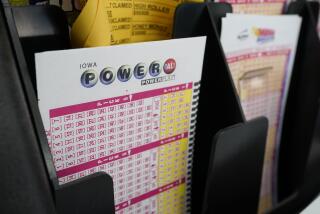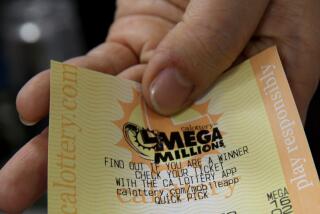Mega Millions recipe: longer odds, bigger pots and fewer winners
There’s at least $400 million on the line in Friday night’s Mega Millions lottery drawing, which has produced the usual heavy breathing over the prospect of big money.
But Andre Evangelista’s chances — and yours — of winning are worse than ever.
“It’s completely unfair,” Cypress resident Evangelista, a frequent lottery player, told me. “They’re making it harder to win so the jackpots get bigger and more people play.”
Personally, I think that regularly buying lottery tickets makes as much financial sense as hoping you’ll trip over a bar of gold on your way to work.
I get, however, that it’s fun to dream of overnight riches, and the lottery, despite its ridiculous odds, offers people a relatively affordable way to buy a little piece of hope.
What has Evangelista, 53, peeved is a recent decision to change the rules of the popular Mega Millions game, which is played in California and 42 other states.
Your odds of winning the jackpot used to be 1 in 176 million. As of Oct. 22, those odds changed to 1 in 259 million.
That’s because you used to have to pick six numbers from 1 to 56. Now you have to pick them from 1 through 75.
The Mega numbers have decreased to 15 from 46, but your overall chances of winning still are substantially reduced.
John Garnett, a UCLA math professor, explained to me that the changes mean that “for every three winners under the old system, now there will be two.”
Put another way, he said, if your chances of winning the jackpot used to suck, “now they suck even more.”
By way of context, your odds of being murdered are just 1 in 18,989, according to the website DiscovertheOdds.com. Your odds of contracting West Nile Virus are 1 in 66,592. And your odds of that statistical favorite, getting hit by lightning, are about 1 in a million.
You thus have way better chances of all those things happening to you than you do of winning the Mega Millions lottery.
The last time anyone won the Mega Millions lottery was Oct. 1, when an anonymous Maryland man nailed a jackpot of $189 million. He opted for taking the money in a lump sum, which will leave him with $86 million after state and federal taxes are deducted.
After the odds changed three weeks later, there hasn’t been a single jackpot winner. Not one.
Five tickets in Tuesday’s drawing matched the first five numbers, scoring the holders a cool $1 million each. But nobody walked away with the $344 million jackpot by hitting all six numbers.
The huge pile of cash on the line Friday night is so far the game’s second-largest pot ever and the fifth-largest in U.S. lottery history.
“The fact that no one has won the jackpot is all you need to know,” Evangelista said. “They made it so nobody wins.”
Well, someone will win, sooner or later. Someone always does. But the element of dumb luck is greater than ever before.
Mega Millions appears to be feeling some heat from the rival Powerball lottery, which routinely boasts jackpots in the hundreds of millions of dollars. Since 2010, both Powerball and Mega Millions have been offered nearly nationwide.
Although participating states get a cut of the action, the games are run — and the rules are controlled — by groups of lottery officials from across the country.
“We can expect to see larger jackpots and greater excitement,” Paula Otto, lead director of the Mega Millions Consortium, said when the rule changes were announced. “Yet one very important thing won’t change. The price of a Mega Millions ticket will remain $1.”
I like how she characterized this as a good thing. What she was really saying is that now you can pay the same amount for an even worse chance of winning big.
If you do win, though, your chances of a larger jackpot have increased. Fewer winners equals bigger jackpots.
Bigger jackpots equals more players. But there’s the rub.
A study published this month in the journal Sociology found that U.S. households spend about $162 a year on lottery tickets, “with low-income households spending around $289.”
The amount spent, as a percentage of total net income, is obviously much higher among lower-income households than it is for higher-income households. By some estimates, as much as 9% of disposable income is spent by lower-income households on lottery tickets.
More players thus equals more people transferring wealth to state agencies — a form of indirect taxation, according to experts, that places much of the burden of funding these public entities on those least able to afford it.
Lotteries returned about $19 billion last year to the states that sponsored them, according to the North American Assn. of State and Provincial Lotteries.
Elias Dominguez, a spokesman for the California Lottery, which runs the various games available statewide, acknowledged that the Mega Millions rules were changed to ensure bigger jackpots.
He said this wasn’t a direct response to the huge Powerball jackpots, but admitted that lottery officials haven’t been blind to Powerball’s popularity.
“It’s harder to win the Mega Millions jackpot now; we understand that,” he said. “But games have to be reinvented every now and then to keep people’s interest.”
He said that even though Mega Millions jackpots are further out of reach, your chances of winning a smaller prize have improved.
Evangelista has been playing for years. He said he spends at least $8 a week on Mega Millions, SuperLotto Plus, Fantasy 5 or Powerball lotteries.
He estimates his winnings over the years at “maybe $20.”
“But all I need is to win one jackpot to catch up,” Evangelista said.
High hopes. Long odds.
David Lazarus’ column runs Tuesdays and Fridays. He also can be seen daily on KTLA-TV Channel 5 and followed on Twitter @Davidlaz. Send your tips or feedback to [email protected].
More to Read
Inside the business of entertainment
The Wide Shot brings you news, analysis and insights on everything from streaming wars to production — and what it all means for the future.
You may occasionally receive promotional content from the Los Angeles Times.











